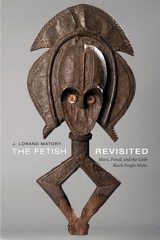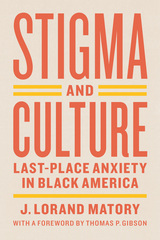2 books about Matory, J. Lor

The Fetish Revisited
Marx, Freud, and the Gods Black People Make
J. Lorand Matory
Duke University Press, 2018
Since the early-modern encounter between African and European merchants on the Guinea Coast, European social critics have invoked African gods as metaphors for misplaced value and agency, using the term “fetishism” chiefly to assert the irrationality of their fellow Europeans. Yet, as J. Lorand Matory demonstrates in The Fetish Revisited, Afro-Atlantic gods have a materially embodied social logic of their own, which is no less rational than the social theories of Marx and Freud. Drawing on thirty-six years of fieldwork in Africa, Europe, and the Americas, Matory casts an Afro-Atlantic eye on European theory to show how Marx’s and Freud’s conceptions of the fetish both illuminate and misrepresent Africa’s human-made gods. Through this analysis, the priests, practices, and spirited things of four major Afro-Atlantic religions simultaneously call attention to the culture-specific, materially conditioned, physically embodied, and indeed fetishistic nature of Marx’s and Freud’s theories themselves. Challenging long-held assumptions about the nature of gods and theories, Matory offers a novel perspective on the social roots of these tandem African and European understandings of collective action, while illuminating the relationship of European social theory to the racism suffered by Africans and assimilated Jews alike.
[more]

Stigma and Culture
Last-Place Anxiety in Black America
J. Lorand Matory
University of Chicago Press, 2015
In Stigma and Culture, J. Lorand Matory provocatively shows how ethnic identification in the United States—and around the globe—is a competitive and hierarchical process in which populations, especially of historically stigmatized races, seek status and income by dishonoring other stigmatized populations. And there is no better place to see this than among the African American elite in academia, where he explores the emergent ethnic identities of African and Caribbean immigrants and transmigrants, Gullah/Geechees, Louisiana Creoles, and even Native Americans of partly African ancestry.
Matory describes the competitive process that hierarchically structures their self-definition as ethnic groups and the similar process by which middle-class African Americans seek distinction from their impoverished compatriots. Drawing on research at universities such as Howard, Harvard, and Duke and among their alumni networks, he details how university life—while facilitating individual upward mobility, touting human equality, and regaling cultural diversity—also perpetuates the cultural standards that historically justified the dominance of some groups over others. Combining his ethnographic findings with classic theoretical insights from Frantz Fanon, Fredrik Barth, Erving Goffman, Pierre Bourdieu and others—alongside stories from his own life in academia—Matory sketches the university as an institution that, particularly through the anthropological vocabulary of culture, encourages the stigmatized to stratify their own.
Matory describes the competitive process that hierarchically structures their self-definition as ethnic groups and the similar process by which middle-class African Americans seek distinction from their impoverished compatriots. Drawing on research at universities such as Howard, Harvard, and Duke and among their alumni networks, he details how university life—while facilitating individual upward mobility, touting human equality, and regaling cultural diversity—also perpetuates the cultural standards that historically justified the dominance of some groups over others. Combining his ethnographic findings with classic theoretical insights from Frantz Fanon, Fredrik Barth, Erving Goffman, Pierre Bourdieu and others—alongside stories from his own life in academia—Matory sketches the university as an institution that, particularly through the anthropological vocabulary of culture, encourages the stigmatized to stratify their own.
[more]
READERS
Browse our collection.
PUBLISHERS
See BiblioVault's publisher services.
STUDENT SERVICES
Files for college accessibility offices.
UChicago Accessibility Resources
home | accessibility | search | about | contact us
BiblioVault ® 2001 - 2024
The University of Chicago Press









